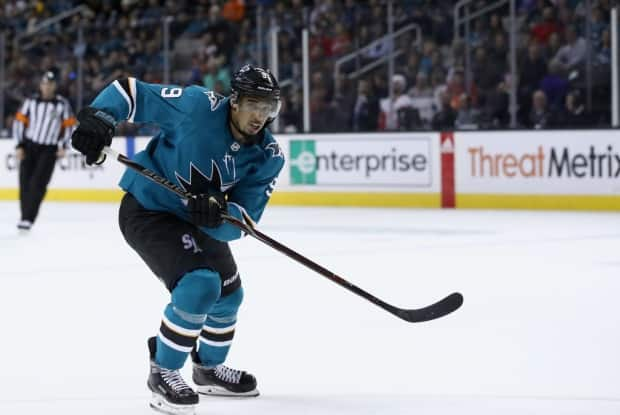Athletes and gambling: Is there anything to learn from Evander Kane's bankruptcy?
The basic facts of Evander Kane's money troubles are laid bare on page 16 of the Chapter 7 bankruptcy claim filed in the Northern District of California on Jan. 9.
Total debts owed by the San Jose Sharks veteran: $26.8 million.
Total assets: $10.2 million, most of it in the value of three houses — two in Vancouver and one in San Jose.
What's less plain to see is how the 29-year-old arrived at this financial breaking point, a dozen years into a professional hockey career that has to date earned him $53 million.
Part of the answer may lie a little deeper in the 73 page document, in the section where the filer has to list losses sustained in the previous one year due to theft, fire, disaster or gambling.
There is a single entry: $1.5 million lost because of "gambling at casino and via bookie (sports betting)."
It's not the first time Kane's gambling has received a public airing.
In 2019, he was sued for half a million dollars by The Cosmopolitan, a casino in Las Vegas.
According to the Las Vegas Review-Journal, court documents stated he owed the casino for eight credits or "markers" in amounts between $20,000 and $100,000 taken out on or about April 15, 2019. The date coincided with the Sharks playing the Golden Knights in Las Vegas during the first round of the Stanley Cup playoffs.
The Cosmopolitan dropped the lawsuit in 2020, likely due to an out-of-court settlement. But the Chapter 7 filing suggests gambling may be a problem for the East Vancouver native.
And he'd hardly be an isolated case, says Declan Hill, University of New Haven professor of investigations specializing in sports, gambling and organized crime.
"This is the tip of an iceberg," said Hill. "There is a silent epidemic of gambling-related addiction issues among professional athletes."
Athletes suck at gambling
Research has shown athletes can be more susceptible to gambling problems. Simply, the qualities that make someone excel in sport are the same ones that make them suck at gambling, said Hill.
"They're dedicated, they're focused, they never give up. They're always chasing because they can overturn a deficit ... going into the last minute or third period," he said.
There's also a dynamic between the casinos or bookmakers who are happy to supply action to young, confident men with money in search of an outlet to their high pressure job.
And unlike other addictions, said Hill, gambling problems aren't easy to spot.
"If a top athlete becomes addicted to cocaine or alcohol, you are going to know. You're going to be able to see physically quite quickly that the athlete is just not as good as they should be," said Hill.
"Become an addict to gambling, and there's no physical sign. The only symptom is the bank account."
Player assistance program
NHL players can seek help through the player assistance program, run jointly by the NHL Players' Association and National Hockey League.
A 1-800 number is available 24 hours a day, seven days a week allowing players to connect confidentially to targeted counselling for things like gambling addiction and substance abuse.
According to NHLPA spokesman Jonathan Weatherdon, program doctors also meet with each team every season to give an overview of the service, including discussions about gambling addiction.
"Per the [Collective Bargaining Agreement] NHL players are not able to bet on NHL games," said Weatherdon.
Kane's bankruptcy filing lists 47 creditors including banks, credit card companies, the IRS, lawyers, his agency and a number of individuals who appear to have extended personal loans.
Generally, in Chapter 7 bankruptcy, the filer's non-exempt assets are liquidated and the proceeds used to pay creditors.
Kane's filing asks the three houses and other personal property be exempted. It also lists seven dependents: his newborn daughter, his parents, a grandmother, two uncles and a sister.
The filing also says he could opt out of his contract at some point this season because of COVID-19 concerns, affecting his salary.
Whatever the final result, most of his creditors will likely receive pennies on the dollar, if anything at all.
The news is much better for Kane himself. Once his debts are discharged he gets a fresh financial start and some breathing room, one would assume, to move on with what's been a life-changing year in other, more positive ways.
He became a father for the first time in the summer. And in the aftermath of George Floyd's murder and the rise of Black Lives Matter, he became a central figure in calling out racial injustice in hockey and is now co-head of the Hockey Diversity Alliance.

And his hockey career is far from over, with four-plus years remaining on the seven year, $49 million contract signed with the Sharks in 2018.
As pro sports and governments rush to increase their revenue base through expanded gaming, Hill says it's important that people understand a basic truth about gambling.
"To be a successful gambler is very, very difficult and the only people who really do it well are emotionless math geeks," he said. "Everyone else should leave it well alone."
Correction: A previous version of this story did not include a caption under a photo of Mr. Akim Aliu that indicated he is a founding member of the Hockey Diversity Alliance. We apologize to Mr. Aliu for the error.

 Yahoo Sports
Yahoo Sports 